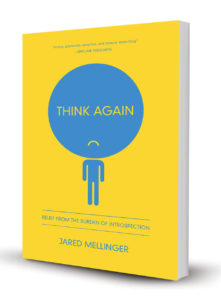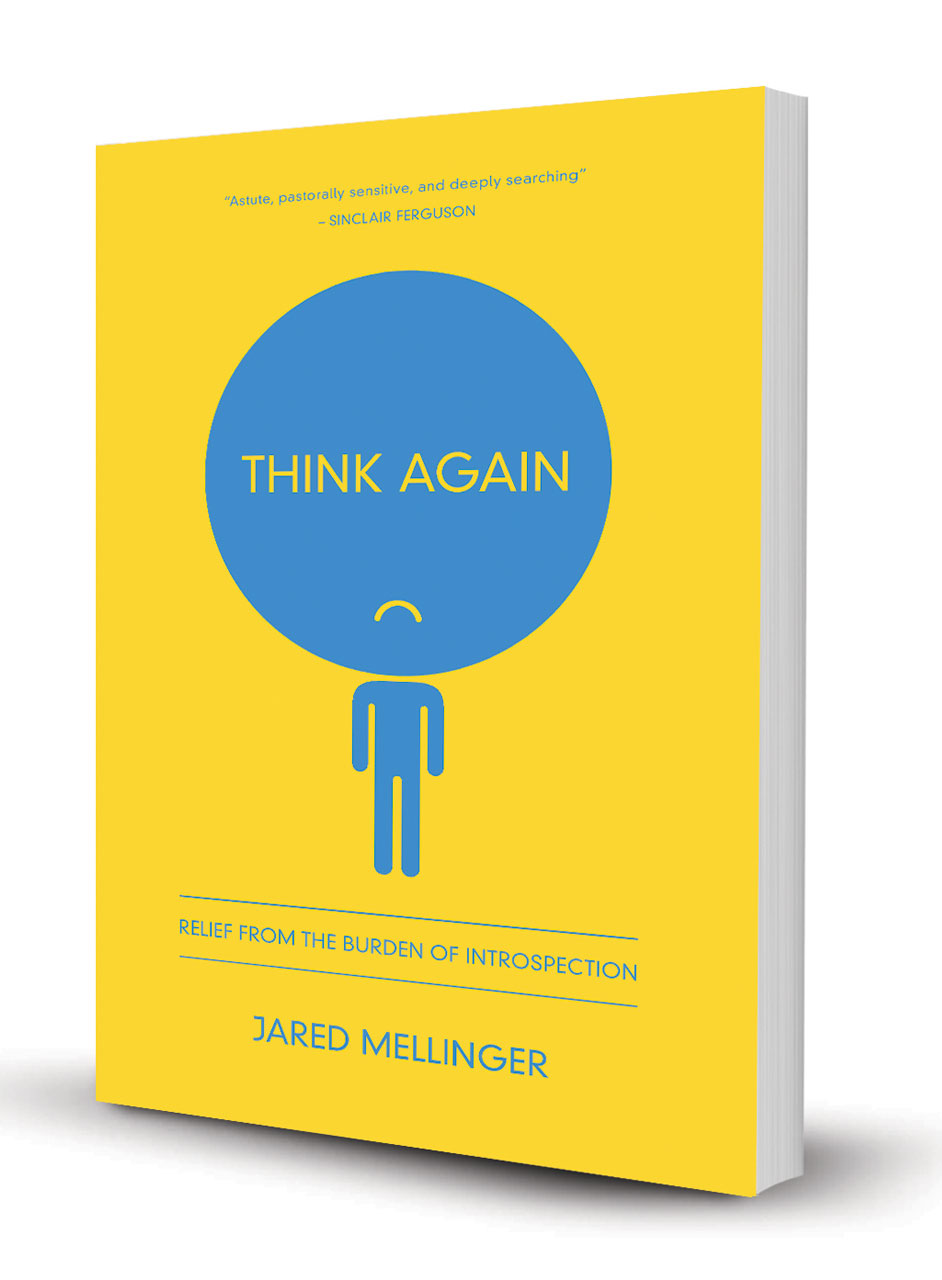 I read a lot of books. About 1 in 10 is worth mentioning. Think Again by Jared Mellinger is one of them. My corner of evangelical christianity is fairly heavily introspective. Many spiritual disciplines and counseling practices emphasize introspection as a means of self-reflection to route out incorrect patterns of thinking. Many sermon applications either implicitly or explicitly encourage it as a means of growth. This introspection can be healthy, but can potentially have a dark side.
I read a lot of books. About 1 in 10 is worth mentioning. Think Again by Jared Mellinger is one of them. My corner of evangelical christianity is fairly heavily introspective. Many spiritual disciplines and counseling practices emphasize introspection as a means of self-reflection to route out incorrect patterns of thinking. Many sermon applications either implicitly or explicitly encourage it as a means of growth. This introspection can be healthy, but can potentially have a dark side.
Jared helpfully outlines the nature of this introspection, it’s growth in emphasis in our culture in recent decades, talks about its benefit and utility, and most helpfully of all, warns of the dark side and potential for ensnarement. Jared compiles some of the “best of” quotes and thoughts from other great thinkers, pastors, and authors (mostly pastors, actually) of the past and present which give us great tools for combating this dark side.
This is a fairly easy read, popular level handling of the topic that will complement a counseling ministry (whether you are the minister, or the one ministered to). I highly recommend this book.
Some personal reflections
On a personal note, the book hooks into a stream that seems to be a recurring theme in my scripture reading, study, and encouragement from brothers and sisters recently (it seems as though the Holy Spirit is trying to get my attention along this line.) That theme is “The Freedom of Self-Forgetfulness” (see the sermon and booklet by Tim Keller by that title). One major aspect of this theme is that we have been betrayed by the self-esteem movement, which has been fairly conclusively shown to be backwards in all its findings.
The false promises of the self-esteem movement
Breaking from a long history of understanding that a too-high view of the self is the root problem of the human condition, the self-esteem movement says the exact opposite, that the problem is a too-low view of self. Consequently, an entire generation fed on the self-esteem movement has been left hanging, encouraged to pursue the very thing that is at the root of much of humanity’s problems: pride in self. Mellinger (quoting many great thinkers and authors on the topic) compiles a very helpful set of tools for escaping the gravity of the false promises of the self-esteem movement.
Some money quotes from the book
“It is good to know ourselves. The only alternatives to self-knowledge are self-ignorance and self-deception.”
(Quoting Richard Lints) “The irony of identity is that by looking away from ourselves we are more likely to discovery our identity.”
“We are not self-created, and our identity is not self-determinded. The doctrine of creation tells us who we are.”
“We tend to base the way we feel about ourselves on our appearance, our performance, or how we measure up against others. We look for value inside ourselves, in our gifts, and attainments. This produces fear and insecurity. But Christ reassures the children of God that we are more valuable than we know, and our value is grounded securely in the unchanging reality of being cared for, protected, and loved by our heavenly Father.”
“…there are holy and unholy ways of thinking highly of yourself, and there are holy and unholy ways of thinking lowly of yourself. Correctly thinking highly of yourself means knowing that you are created in God’s image… …God’s way to think lowly of yourself is to consider yourself the foremost of sinners and to consider others more important than yourself.”
“Self-loathing attitudes cannot be overcome by replacing them with self-confident attitudes.”
“We [christians] are to examine ourselves to see that Christ is in us.” (applying 2 Corinthians 13:5)
“Do you believe that the Lord sees your efforts to please him and that he delights in your good works?” (reflecting on Hebrews 6:10)
“…the Spirit of God delights to give his people a deeper awareness of sin — not to discourage us, but to grant us a deeper gratitude for the glory of the salvation we have received.”
“…by attempting to attain joy and peace through a means other than dissatisfaction with self, we forfeit the very joy and peace we are aiming for. Cultivating a sense of dissatisfaction with self is the only path to joy in Christ.”
(Quoting John Stott) “There is nothing morbid about the confession of sins, so long as we go on to give thanks for the forgiveness of sins. It is fine to look inwards, so long as it leads us immediately to look outwards and upwards again.”
(Quoting John Piper on the viewing of art, the dwelling in nature, and the participation in sports as a means to get over unhealthy views of self) – “No one goes to the Grand Canyon to increase their self esteem.”
There’s a lot more where these came from! I’d encourage you to pick up a copy of the book. :)
More information and reviews and author info can be found on Litfuse’s site!
(Quick FYI that I was graciously provided a copy of this book for review by Litfuse Publicity in partnership with New Growth Press. Though I was glad to post a positive review after reading and pondering the book. I have declined to post others in the past and once even posted a negative review ;-). The links to the books are Amazon affiliate links so I get a small kickback of any orders that result from me wielding my exceedingly massive influence in discussing this book. (I hope that sarcasm came through thick enough…))
